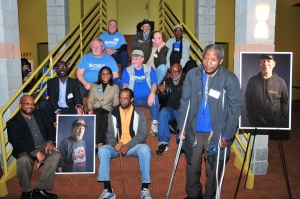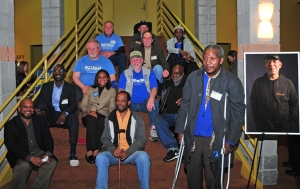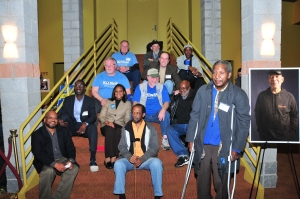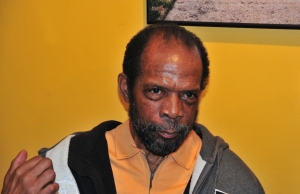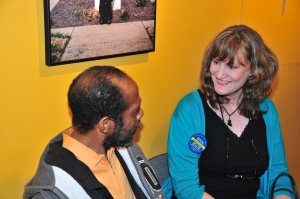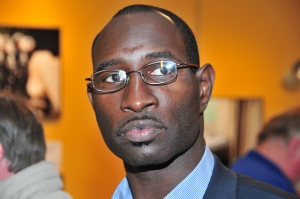Tonight’s episode of the series questioning how some people ended up on death row was about a man named John Thompson who was convicted of murder in 1985. The treatment of his connection to the murder of a young man was a little on the thin side. That’s not the point. The problem examined, once again, was government misconduct. In this case, Thompson was convicted of two crimes, one involving a car-jacking with people in the car and the other a murder. It was important to the prosecution case to go to trial first on the car-jacking and get a conviction because that conviction could then be used against Thompson in the murder trial, to show that he had a record. The conviction effectively prevented Thompson from taking the witness stand in his own behalf because the conviction could be used against him. As I remember the description of Thompson, he did not have a record otherwise.
There was evidence collected at the scene of the car-jacking indicating that the person responsible was injured and his blood ended up on the clothing of the victims. The clothing disappeared and the blood test performed on it was not revealed to the defense. When this aspect of the case was investigated years later, it turned out that the presumed criminal had a different blood type from Thompson. If the police theory is correct that the blood on the victim’s clothing was that of the car jacker, this would exonerate Thompson. The government’s explanation of its treatment of evidence is not credible, leaving one to infer that it was not in the prosecution’s interest to tell the defense it had good reason to believe Thompson was innocent. Of course, this is not what was said, but that is, I suggest, a reasonable interpretation of the evidence set forth in the show. There was also a question of the reliability of eyewitness testimony.
The murder case was built upon the car jacking case, so its foundation was shaky at best. It turns out that the star witness was paid $10,000 to testify against Thompson. There was a reduced sentence deal in this trial also. None of this was revealed until Thompson had been in jail for many years. Eventually, the convictions were vacated and after some indecision on the part of the prosecution, Thompson had a new trial on the murder charge and was not convicted. Because he was, for all intents and purposes framed by the government, as presented in this show, he sued the authorities involved and received a judgement of $14,000,000. This was appealed and reversed in a decision by the United States Supreme Court. The 5-4 decision was written by Justice Thomas.
What I’ve said up to now raises many questions. Here are a few that jump out.
Who has $10,000 to buy a witness’s testimony? We’re all familiar with plea deals, but who has that kind of money to give someone? That is, where did it come from? If the government itself, where does the paper trail lead and why were we not told that someone has been prosecuted? I assume we were not told about a prosecution because no one was prosecuted. Surely, this is not a legitimate governmental use of public money, so what about a prosecution of any government officials involved in this transfer of funds? If it was private money, wouldn’t that qualify as corruption, obstruction of justice, if you will? Suborning perjury? Maybe misprision of a felony (perjury)? Again, where’s the prosecution? Surely, even in Louisiana this must be wrong, mustn’t it?
Also, supposedly one of the goals of any justice system is to punish those who commit crimes, especially violent crimes with victims. Does anyone care that an innocent person was convicted and lost many years of his life in a jail cell instead of being with his family, and the person who committed the crime was free to commit more crimes if he chose? The law enforcement personnel in these shows never seem to care about these things, and I don’t have the impression (I may be wrong) that the show is trying to paint them in a bad light in these instances.
Next, why should we respect the rulings of the United States Supreme Court? That’s not a rhetorical question. Brady v. Maryland was decided in 1963. The murder case under discussion was tried in1985. That’s over two decades when lawyers are supposed to know that exculpatory or potentially exculpatory evidence has to be revealed to the defense. Put aside for the moment the payment of money to suborn perjury and just look at the Brady material. Maybe there is an important decision to be made at times as to whether evidence is exculpatory. I don’t think that was the case here or in some of the other shows we have seen in this series. No one gives a damn about complying with the ruling in Brady, apparently, and it seems as though we hear next to nothing about this attitude. Why should ordinary members of the public respect the rulings of the United States Supreme Court when it is obvious that there are law enforcement personnel, some of them lawyers, who must not respect the rulings because they do not obey them.
There is a part of this evening’s show that strikes me as poorly handled or perhaps just disingenuous. Prosecutors were asked about the guidance they received in the office for situations such as those involving Brady material. They said that there was no intention to share anything more than could not be avoided and handbooks were incorrect in setting forth standards. Well, so what? Handbooks are there for the use of those who need guidance in such matters. We are talking about lawyers, I assume members of the Bar in Louisiana, who ought to know what the Supreme Court has said about the conduct of the cases they handle. It is pathetic to hear Harry Connick, Sr. say that he hasn’t opened a law book since law school. That by itself probably tells you everything you need to know about the justice system in New Orleans if not all of Louisiana. What about the younger prosecutors who came into the office as the years passed? Should we really believe they knew nothing of something covered in basic criminal procedure courses in law school? For that matter, if I remember correctly, Connick was the DA from about 1972 to 2003, so it is not clear from this information when he was graduated from law school (or where he went to school, not that the school should make a difference as long as it was an ABA accredited school), but is it too much to ask that he be familiar with a critical element of law enforcement that had been the law of the land for about 10 years when he became DA? In other words, it sounds like he was never worthy of the job from the time he took office until he left. That statement is based on his words, and is not merely a personal opinion on my part.
A well-known retired Superior Court judge in Delaware told the lawyers in a case he was hearing before his retirement that he kept up with changes in the law by reading Readers Digest. I was told that by one of the lawyers in the pretrial conference who heard him say it. I do not practice criminal law, but I have been a faithful watcher of Law & Order for many years.
You see, there really are ways to find out about developments in the law that took place in the ancient days of 1963.
Aside from an innocent person or someone wrongfully convicted going free occasionally, is there ever any reason to pay attention to Brady? For most of us, that is a rhetorical question and the answer is that we have a personal code of ethics that demands we try to do our jobs properly. By now, we all know of too many instances when Brady material is not made available to the defense, and so we must conclude that there are prosecutors who do not intend to obey the law. How can we respect the law when we know there are people entrusted with its enforcement who do not obey the law? To be vulgar about it, is there ever an episode of the new Hawaii 50 where the perp should not go free because of egregious police misconduct in handling the case?
Something I wonder about a lot is the Wong Sun doctrine. This is sometimes referred to on tv shows as the “fruit of the poisoned tree” doctrine. Briefly, if you break the law to gain evidence and this results in finding evidence of criminal conduct on the part of the person being investigated, it cannot be used against that person because of the way the evidence was obtained. It makes sense and it seems right, but does anyone really abide by it?
Step back from these situations and look at the big picture. There are a lot, a very large number, of police officers and prosecutors who are dedicated to doing their jobs lawfully and well, and they deserve the respect and gratitude of all citizens. The people in law enforcement who do not obey the law stand out from the others because their behavior is so unacceptable and offensive. I really do not believe they are in the majority. The problem is, how are we to know who is a bad apple? Eventually, it will come out, but knowing that it may take a long time, perhaps years or even decades, how can we afford to have a death penalty that may lead to the executions of innocent people? It’s bad enough that an innocent person may spend years in jail, but there can be release and perhaps even a monetary reward that will never make amends. You can’t say that with the death penalty.
The 5-4 decision to prevent Thompson from receiving compensation for his years in jail may be rightly decided. I haven’t had a chance to read it and so I don’t have an opinion. As presented in this show, it is unsupportable. My own bias may come into play here. I’ve never had a good opinion of the author. As you may recall, when Justice O’Connor was still on the Court he took a position that there was nothing wrong with prison guards beating up prisoners. Justice O’Connor and others wrote that this behavior could be described as “cruel and unusual punishment.” There’s no way we can get more information out of one of the people responsible for putting him on the Court, the one who advocated the single bullet theory unless he left diaries or letters that have yet to see the light of day. There is, of course, someone still alive who had a role in this appointment, but how can you know what to believe when he talks about his career? That’s rhetorical, too.
Perhaps the big lesson we can take from the cases aired on this show is that government misconduct that can lead to the imprisonment or even deaths of persons charged with crimes they did not commit is not restricted to one geographic area. It does, however, appear to happen a lot to those unable to afford a good defense. Thompson, tonight, did not even know his own blood type, which strikes me as evidence of socioeconomic disadvantage during most or all of his life. Would someone differently situated have ended up on death row? That’s a fair question and I’m not sure there is a really good answer, although I suspect the correct answer is “no”. Is there any wonder that many people distrust law enforcement? That is not healthy for any segment of society.
This show is now on hiatus, returning in the summer with new episodes. It will be interesting to see if it continues to present thought provoking stories.








